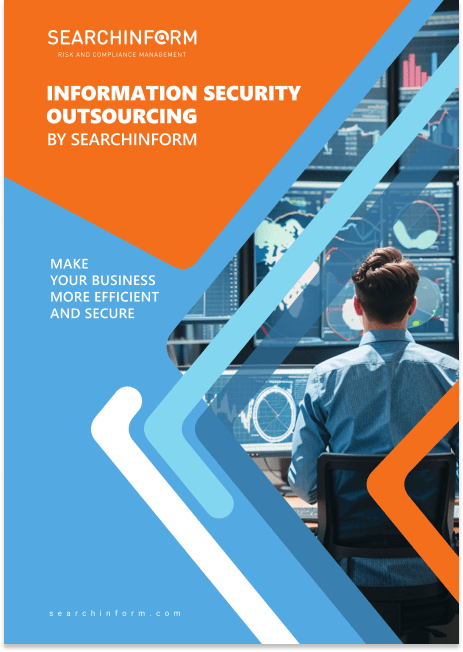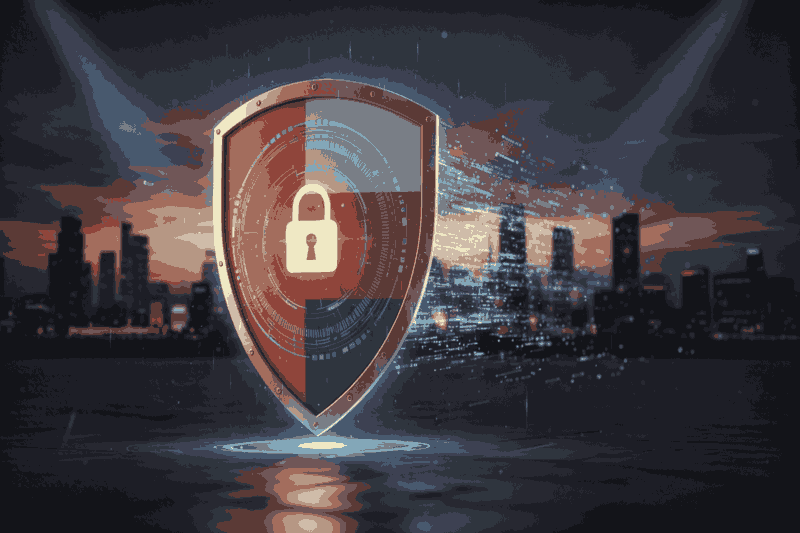Personal Cybersecurity: Essential Tips for Staying Safe Online
- Understanding Personal Cybersecurity
- Definition and Importance
- Common Cyber Threats Individuals Face
- The Cost of Cyber Insecurity
- The Role of Education in Personal Cybersecurity
- Best Practices for Personal Cybersecurity
- Creating Strong and Unique Passwords
- Using Two-Factor Authentication
- Regularly Updating Software and Devices
- Educating Yourself on Cybersecurity
- Practicing Safe Online Behavior
- Protecting Personal Information Online
- Recognizing Phishing Attempts
- Safeguarding Social Media Accounts
- Managing Privacy Settings
- Utilizing Security Tools and Software
- Antivirus and Anti-malware Solutions
- Password Managers
- VPNs and Secure Browsing
- Integrating Security Tools into Daily Life
- Staying Safe on Public Wi-Fi
- Risks of Using Public Wi-Fi
- Tips for Secure Connections
- Using VPNs on Public Networks
- Practical Steps to Stay Safe
- How Searchinform Enhances Personal Data Security Within Organizations
- The Importance of Personal Data Security in Organizations
- Understanding SearchInform's Role
- Key Features of SearchInform
- Enhancing Individual Cybersecurity with SearchInform
- The Impact of SearchInform on Organizational Security
Understanding Personal Cybersecurity
Definition and Importance
Personal cybersecurity, also known as personal digital security or individual cybersecurity, refers to the practices and technologies employed to protect an individual's digital life from malicious attacks. In today's interconnected world, where our lives are increasingly digital, ensuring personal cybersecurity has never been more critical. Whether it's safeguarding personal information, financial details, or private communications, the need for robust individual cybersecurity measures is paramount.
With the rise of cyber threats, understanding personal cybersecurity is essential for everyone. It involves not only using antivirus software and strong passwords but also being aware of potential risks and how to mitigate them. By prioritizing personal digital security, individuals can protect themselves from a myriad of cyber threats that can compromise their privacy and financial well-being.
Common Cyber Threats Individuals Face
Cyber threats are becoming more sophisticated and prevalent, targeting individuals indiscriminately. Some of the most common threats include:
- Phishing Attacks: Deceptive emails or messages that trick individuals into providing personal information.
- Malware: Malicious software designed to damage, disrupt, or gain unauthorized access to computer systems.
- Ransomware: A type of malware that encrypts a victim's data and demands payment for its release.
- Identity Theft: The fraudulent acquisition and use of a person's private identifying information, usually for financial gain.
- Social Engineering: Manipulating individuals into divulging confidential or personal information.
Each of these threats poses significant risks to personal cybersecurity, making it crucial for individuals to stay informed and vigilant.
The Cost of Cyber Insecurity
Failing to prioritize personal cybersecurity can have severe financial, emotional, and reputational consequences. The costs of cyber insecurity extend far beyond monetary loss. Victims of cyberattacks often face:
- Financial Loss: Direct theft of money or financial information can lead to significant economic hardship.
- Emotional Distress: The stress and anxiety resulting from a cyberattack can be overwhelming.
- Reputational Damage: Breaches of personal data can tarnish an individual's reputation, especially if sensitive information is leaked.
Moreover, the indirect costs, such as the time and effort required to recover from an attack, can be substantial. According to a report by Cybersecurity Ventures, cybercrime damages are expected to reach $6 trillion annually by 2021. This staggering figure underscores the importance of robust personal digital security measures.
The Role of Education in Personal Cybersecurity
Education is a powerful tool in the fight against cyber threats. By understanding the fundamentals of personal digital security, individuals can make more informed decisions about protecting their digital lives. Cybersecurity education should start early and continue throughout one's life, adapting to new technologies and emerging threats.
Programs and workshops focused on personal cybersecurity can equip individuals with the knowledge and skills needed to recognize and respond to cyber threats effectively. Whether through formal education or self-study, increasing one's cybersecurity awareness is a proactive step towards a safer digital existence.
In a world where cyber threats are a constant and evolving challenge, personal cybersecurity must be a priority for everyone. By understanding the importance of personal digital security, recognizing common cyber threats, and taking proactive measures to enhance individual cybersecurity, individuals can protect themselves and their information from malicious attacks. Investing time and resources into personal cybersecurity is not just a precaution—it's a necessity in the digital age.
Best Practices for Personal Cybersecurity
Creating Strong and Unique Passwords
Imagine leaving the front door of your house unlocked. That’s essentially what using weak or repeated passwords does to your personal cybersecurity. Crafting strong, unique passwords for each of your online accounts is one of the simplest yet most effective measures to bolster your personal digital security.
To create a robust password:
- Combine Different Characters: Use a mix of upper and lower case letters, numbers, and special characters.
- Length Matters: Aim for passwords that are at least 12 characters long.
- Avoid Predictable Choices: Steer clear of easily guessable passwords like "password123" or "qwerty."
Password managers can be invaluable tools, generating and storing complex passwords so you don’t have to remember them all. By diversifying your passwords, you significantly reduce the risk of multiple accounts being compromised if one password is breached.

Using Two-Factor Authentication
Think of two-factor authentication (2FA) as an extra lock on your digital front door. Even if someone manages to steal your password, 2FA adds an additional layer of security, requiring a second form of verification—often a code sent to your phone or generated by an app.
Implementing 2FA is straightforward and offers substantial benefits:
- Enhanced Security: Adds an extra barrier against unauthorized access.
- Wide Availability: Most major online services, from email providers to social media platforms, offer 2FA options.
- Peace of Mind: Provides added assurance that your accounts are more secure.
While it might seem like an extra step, the added protection 2FA offers makes it a critical component of personal cybersecurity.
Regularly Updating Software and Devices
Keeping your software and devices up to date is akin to maintaining the locks and alarms on your home. Regular updates ensure that your systems are protected against the latest threats, as developers frequently release patches to fix security vulnerabilities.
Key reasons to update regularly include:
- Protection Against Exploits: Updates often address security holes that hackers exploit.
- Improved Performance: Updates can also enhance the functionality and efficiency of your software and devices.
- Access to New Features: Staying current means you benefit from the latest innovations and improvements.
Set your devices to update automatically when possible. This small step can have a big impact on maintaining your personal digital security, ensuring that you’re shielded from the latest cyber threats.
Educating Yourself on Cybersecurity
The landscape of cyber threats is continually evolving, making education a cornerstone of personal cybersecurity. Staying informed about new threats and security practices can dramatically improve your ability to defend against attacks.
Consider these educational strategies:
- Follow Reputable Cybersecurity Blogs: Websites like Krebs on Security or the official blogs of antivirus companies offer valuable insights and updates.
- Participate in Workshops and Webinars: Many organizations offer free or low-cost training on personal digital security.
- Utilize Online Courses: Platforms like Coursera and Udemy provide in-depth courses on individual cybersecurity.
By continually enhancing your knowledge, you can stay one step ahead of cybercriminals and better protect your personal information.
Practicing Safe Online Behavior
Safe online behavior is the foundation of personal cybersecurity. Being cautious and deliberate in your online interactions can prevent many common cyber threats.
Adopt these habits for better online security:
- Be Skeptical of Emails and Links: Avoid clicking on unknown links or downloading attachments from untrusted sources.
- Monitor Your Accounts Regularly: Keep an eye on your bank statements and online accounts for any unusual activity.
- Limit Personal Information Sharing: Be mindful of the information you share on social media and other online platforms.
Developing these habits can significantly reduce your risk of falling victim to cyberattacks, enhancing your personal digital security in the process.
In an era where our lives are intertwined with technology, personal cybersecurity is not just a necessity but a responsibility. By creating strong, unique passwords, using two-factor authentication, keeping your software up to date, educating yourself, and practicing safe online behavior, you can fortify your personal digital security against a myriad of threats. Protecting your digital life requires ongoing vigilance and a proactive approach, but the peace of mind it provides is well worth the effort.
and perform with SearchInform DLP:
Protecting Personal Information Online
Recognizing Phishing Attempts
Imagine receiving an email that looks exactly like it’s from your bank, asking you to verify your account information. This is a classic example of a phishing attempt, a deceptive practice used by cybercriminals to steal sensitive data. Recognizing these fraudulent messages is crucial for maintaining personal cybersecurity.
Phishing attacks can be cunning and sophisticated, often appearing legitimate. Here are some telltale signs to look out for:
- Generic Greetings: Legitimate organizations usually address you by name, not with a generic "Dear Customer."
- Urgent Requests: Be wary of emails that create a sense of urgency or fear, prompting immediate action.
- Suspicious Links and Attachments: Hover over links to see where they actually lead before clicking. Avoid downloading unexpected attachments.
- Spelling and Grammar Mistakes: Many phishing emails contain obvious spelling and grammar errors.
By staying vigilant and skeptical of unsolicited communications, you can significantly enhance your personal digital security.
Safeguarding Social Media Accounts
Your social media profiles contain a treasure trove of personal information that can be exploited if not properly secured. Protecting these accounts is a vital aspect of individual cybersecurity.
Consider implementing the following measures to safeguard your social media accounts:
- Strong, Unique Passwords: Ensure each account has a different, robust password to prevent a breach in one from compromising others.
- Enable Two-Factor Authentication: Add an extra layer of protection to your accounts, making it harder for unauthorized users to gain access.
- Regularly Review Account Activity: Check for any unfamiliar logins or posts, and report any suspicious behavior immediately.
- Limit Personal Information Sharing: Be cautious about the details you share, such as your location, birthdate, and travel plans.
By taking these steps, you can protect your social media presence from cyber threats, ensuring your personal information remains secure.
Managing Privacy Settings
The privacy settings on your online accounts are your first line of defense against unauthorized access. Properly managing these settings is essential for maintaining personal cybersecurity and protecting your personal digital security.
Here’s how you can effectively manage your privacy settings:
- Review and Adjust Default Settings: Most platforms have default settings that are not optimal for privacy. Customize these settings to suit your needs.
- Control Who Can See Your Information: Limit visibility of your personal information to trusted contacts only.
- Disable Location Services: Unless necessary, turn off location tracking to prevent apps from collecting and sharing your whereabouts.
- Regularly Audit Permissions: Periodically review the permissions granted to apps and services, revoking access that’s no longer needed.
These actions help you maintain control over your personal information, significantly enhancing your individual cybersecurity.
In our increasingly digital world, personal cybersecurity is not just an option but a necessity. By recognizing phishing attempts, safeguarding social media accounts, managing privacy settings, and continuously educating yourself about new threats, you can significantly enhance your personal digital security. These proactive measures will help ensure that your personal information remains protected, giving you peace of mind in your online activities. Remember, individual cybersecurity is an ongoing commitment that requires vigilance, awareness, and action.
Utilizing Security Tools and Software
Antivirus and Anti-malware Solutions
Imagine your computer as a fortress. Just as you wouldn't leave your home without locking the doors, you shouldn't go online without the protection of antivirus and anti-malware solutions. These tools are essential components of personal cybersecurity, providing a crucial line of defense against a myriad of digital threats.
Antivirus and anti-malware software work by detecting, quarantining, and removing malicious software that can infiltrate your system. Here’s why they are indispensable:
- Real-Time Protection: Modern solutions offer real-time scanning to block threats as they arise, ensuring continuous protection.
- Comprehensive Coverage: They defend against various threats, including viruses, spyware, ransomware, and more.
- Regular Updates: Constant updates ensure that the software can recognize and combat the latest threats.
Investing in reputable antivirus and anti-malware programs is a foundational step in safeguarding your personal digital security. Regularly updating and running these tools can help maintain a secure and healthy digital environment.
Password Managers
In today’s digital age, managing passwords can feel like juggling flaming torches. Each online account requires a unique and complex password, but remembering all of them can be overwhelming. This is where password managers become invaluable, enhancing individual cybersecurity by securely storing and organizing your passwords.
Password managers offer several benefits:
- Strong, Unique Passwords: They generate and store complex passwords, reducing the risk of breaches.
- Convenience: With a password manager, you only need to remember one master password.
- Cross-Device Syncing: Many password managers synchronize across devices, ensuring access to your passwords wherever you go.
Popular password managers like LastPass, Dashlane, and 1Password provide a user-friendly interface and robust security features. By using a password manager, you can significantly improve your personal digital security, protecting your accounts from unauthorized access.
VPNs and Secure Browsing
Think of a Virtual Private Network (VPN) as a private tunnel through the internet. It encrypts your internet connection, shielding your online activities from prying eyes. Utilizing a VPN is a powerful way to enhance personal cybersecurity, particularly when using public Wi-Fi networks.
The advantages of using a VPN include:
- Enhanced Privacy: VPNs mask your IP address, making it difficult for websites and advertisers to track your online behavior.
- Secure Data Transmission: Encryption ensures that your data is protected from interception by cybercriminals.
- Access to Restricted Content: VPNs can bypass geo-restrictions, granting access to content that may be blocked in your region.
For secure browsing, combine a VPN with privacy-focused web browsers like Brave or Firefox. These browsers offer additional features, such as ad-blocking and tracking protection, further bolstering your personal digital security.
Integrating Security Tools into Daily Life
Implementing security tools and software is not just about installation; it’s about integrating these tools into your daily routine to ensure ongoing personal cybersecurity. Here’s how you can do it effectively:
- Regular Scans and Updates: Schedule regular scans with your antivirus software and ensure all tools are up to date.
- Use Password Managers Consistently: Store all your passwords in the manager, and let it generate new ones when creating accounts.
- Activate Your VPN: Make it a habit to activate your VPN whenever you connect to the internet, especially on public networks.
By making these practices a part of your daily digital life, you can maintain a high level of individual cybersecurity, protecting your personal information from ever-evolving threats.
In a world where cyber threats are increasingly sophisticated, utilizing security tools and software is imperative for personal cybersecurity. Antivirus and anti-malware solutions, password managers, and VPNs are vital components that help safeguard your personal digital security. By incorporating these tools into your daily online activities, you can protect your digital life from potential threats, ensuring that your personal information remains secure and private. Individual cybersecurity is an ongoing process, requiring vigilance and the consistent use of protective measures to stay safe in the digital age.
Staying Safe on Public Wi-Fi
Risks of Using Public Wi-Fi
Public Wi-Fi networks, while convenient, can be a hotbed for cyber threats, posing significant risks to your personal cybersecurity. When you connect to an unsecured public network, you expose yourself to a variety of dangers. Cybercriminals can easily intercept your data, leading to potential identity theft, financial loss, and privacy breaches.
One of the primary risks is man-in-the-middle attacks, where an attacker intercepts communication between your device and the Wi-Fi network. Additionally, public networks often lack robust encryption, making it easier for hackers to access your personal information. Other threats include rogue hotspots, which mimic legitimate Wi-Fi networks to lure unsuspecting users into connecting, and malware distribution, where malicious software is spread over the network.
Being aware of these risks is the first step towards protecting your personal digital security while using public Wi-Fi.
Tips for Secure Connections
Protecting your personal cybersecurity on public Wi-Fi involves adopting several best practices. Here are some essential tips to help you maintain a secure connection:
- Avoid Sensitive Transactions: Refrain from accessing bank accounts, entering credit card details, or making online purchases while connected to public Wi-Fi.
- Use HTTPS Websites: Ensure that the websites you visit use HTTPS, which encrypts data between your browser and the website server.
- Turn Off Sharing: Disable file sharing, printer sharing, and other network discovery settings to minimize your exposure.
- Forget the Network: After using a public Wi-Fi network, make sure to forget it on your device to prevent automatic reconnections.
- Keep Software Updated: Regularly update your operating system, browser, and apps to protect against security vulnerabilities.
By following these tips, you can significantly enhance your individual cybersecurity and reduce the risk of falling victim to cyberattacks on public Wi-Fi.
Using VPNs on Public Networks
Using a Virtual Private Network (VPN) on public Wi-Fi is one of the most effective ways to secure your personal digital security. A VPN creates an encrypted tunnel between your device and the internet, ensuring that all data transmitted is protected from prying eyes.
Here’s why using a VPN is crucial when connecting to public Wi-Fi:
- Encryption: VPNs encrypt your internet traffic, making it unreadable to anyone who might intercept it.
- Anonymity: By masking your IP address, a VPN enhances your privacy and makes it harder for websites and hackers to track your online activities.
- Access to Restricted Content: VPNs can also help you bypass geo-restrictions, allowing you to access content that might be blocked in certain regions.
To make the most of a VPN, choose a reputable provider that offers strong encryption, a no-logs policy, and high-speed servers. Popular VPN services like NordVPN, ExpressVPN, and CyberGhost are known for their robust security features and reliability.
Practical Steps to Stay Safe
Integrating these security practices into your routine will significantly enhance your personal cybersecurity when using public Wi-Fi. Here’s how you can apply them effectively:
- Activate Your VPN: Make it a habit to turn on your VPN every time you connect to a public Wi-Fi network. Ensure it is set to start automatically on your device.
- Check Website Security: Look for the padlock symbol in your browser’s address bar and ensure the URL begins with HTTPS before entering any personal information.
- Use Multi-Factor Authentication (MFA): Enable MFA on your accounts to add an extra layer of security, making it harder for hackers to gain access even if your password is compromised.
- Regularly Monitor Accounts: Keep an eye on your bank statements and online accounts for any suspicious activity, and report any anomalies immediately.
By consistently applying these practices, you can protect your personal digital security and enjoy the convenience of public Wi-Fi without compromising your safety.
Staying safe on public Wi-Fi requires a proactive approach to personal cybersecurity. By understanding the risks, following essential security tips, and using tools like VPNs, you can significantly reduce the chances of falling victim to cyber threats. Personal digital security is an ongoing commitment, and by adopting these practices, you can ensure that your online activities remain secure and your personal information protected. Whether you're at a café, airport, or library, these strategies will help you maintain a strong defense against potential cyberattacks.
How Searchinform Enhances Personal Data Security Within Organizations
The Importance of Personal Data Security in Organizations
In today's digital age, protecting personal data within an organization is crucial. Personal cybersecurity isn't just a concern for individuals; it extends to the corporate environment where sensitive information is constantly processed and stored. The consequences of a data breach can be severe, affecting both the organization and its employees. To mitigate these risks, companies are turning to advanced solutions like SearchInform to enhance their personal digital security.
Understanding SearchInform's Role
SearchInform is a comprehensive data protection and risk management solution designed to safeguard sensitive information within an organization. By implementing SearchInform, businesses can ensure robust personal data security, mitigating the risks of data breaches and cyber threats. This platform offers a suite of tools that monitor, analyze, and protect personal and organizational data.
Key Features of SearchInform
SearchInform provides a range of features that collectively bolster individual cybersecurity within an organization. Here are some of the key functionalities that make it a powerful tool for enhancing personal digital security:
- Data Leakage Prevention (DLP): SearchInform's DLP system monitors data flow across the organization, detecting and preventing unauthorized access or transfer of sensitive information. It ensures that personal data remains secure and compliant with regulations.
- User Activity Monitoring: By tracking user behavior, SearchInform identifies suspicious activities that could indicate potential security threats. This feature helps in proactively addressing risks before they escalate into major breaches.
- Risk Management: SearchInform evaluates potential risks associated with data handling and provides actionable insights to mitigate these risks. This includes identifying vulnerabilities and implementing measures to enhance personal digital security.
- Compliance Management: Ensuring compliance with data protection laws is a critical aspect of individual cybersecurity. SearchInform helps organizations adhere to legal requirements by monitoring and reporting on data usage and security practices.
Enhancing Individual Cybersecurity with SearchInform
Implementing SearchInform within an organization significantly enhances personal cybersecurity. Here's how this solution contributes to a safer digital environment:
- Comprehensive Data Protection: SearchInform's multi-layered security approach ensures that personal data is protected at all stages, from collection to storage and transfer. This reduces the risk of data breaches and unauthorized access.
- Real-Time Monitoring and Alerts: The platform provides real-time monitoring and instant alerts on any suspicious activity. This allows for immediate action, preventing potential breaches and ensuring continuous protection of personal information.
- Employee Training and Awareness: SearchInform also offers tools for employee training, helping staff understand the importance of personal digital security and how to maintain it. Educated employees are a key defense against cyber threats.
- Automated Compliance Checks: With SearchInform, organizations can automate compliance checks, ensuring that all data handling processes meet legal and regulatory standards. This reduces the risk of non-compliance penalties and enhances overall security.
The Impact of SearchInform on Organizational Security
The implementation of SearchInform has a profound impact on the overall security posture of an organization. By focusing on personal cybersecurity, businesses can protect their most valuable asset – data. This not only includes customer information but also the personal data of employees and stakeholders.
In an era where data breaches and cyber threats are prevalent, enhancing personal data security within organizations is more important than ever. SearchInform provides a comprehensive solution that addresses various aspects of individual cybersecurity, from data protection to compliance management. By leveraging SearchInform, organizations can create a secure digital environment that protects personal information and ensures regulatory compliance. Investing in robust personal digital security measures like SearchInform is not just a strategic decision but a necessity in today's interconnected world.
Enhance your organization's data security by implementing SearchInform's comprehensive protection and risk management solutions. Take proactive steps today to safeguard your personal and organizational data, ensuring compliance and peace of mind in the digital age.
Extend the range of addressed challenges with minimum effort
Company news
SearchInform uses four types of cookies as described below. You can decide which categories of cookies you wish to accept to improve your experience on our website. To learn more about the cookies we use on our site, please read our Cookie Policy.
Necessary Cookies
Always active. These cookies are essential to our website working effectively.
Cookies does not collect personal information. You can disable the cookie files
record
on the Internet Settings tab in your browser.
Functional Cookies
These cookies allow SearchInform to provide enhanced functionality and personalization, such as remembering the language you choose to interact with the website.
Performance Cookies
These cookies enable SearchInform to understand what information is the most valuable to you, so we can improve our services and website.
Third-party Cookies
These cookies are created by other resources to allow our website to embed content from other websites, for example, images, ads, and text.
Please enable Functional Cookies
You have disabled the Functional Cookies.
To complete the form and get in touch with us, you need to enable Functional Cookies.
Otherwise the form cannot be sent to us.

Subscribe to our newsletter and receive a bright and useful tutorial Explaining Information Security in 4 steps!

Subscribe to our newsletter and receive case studies in comics!







